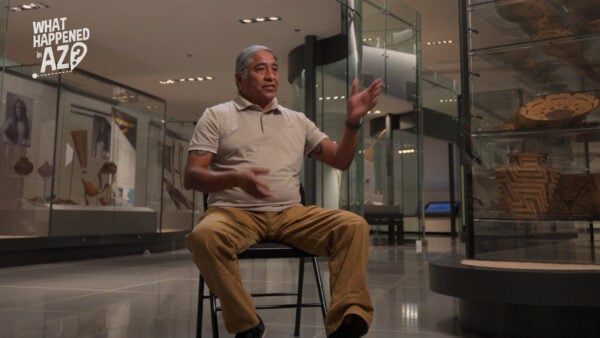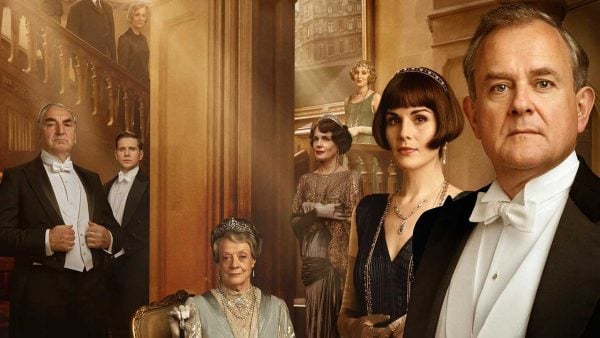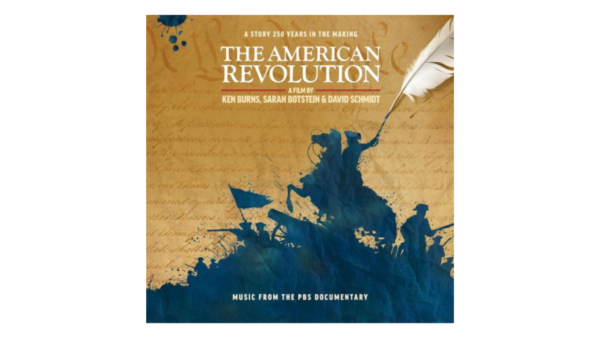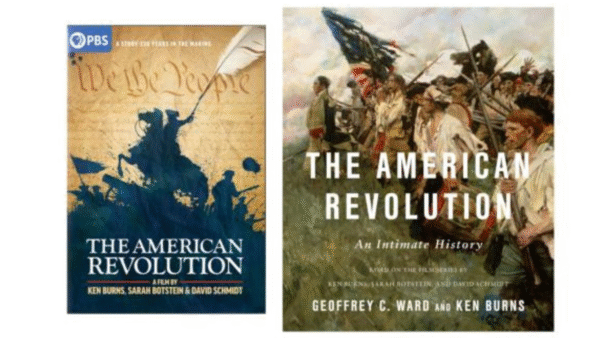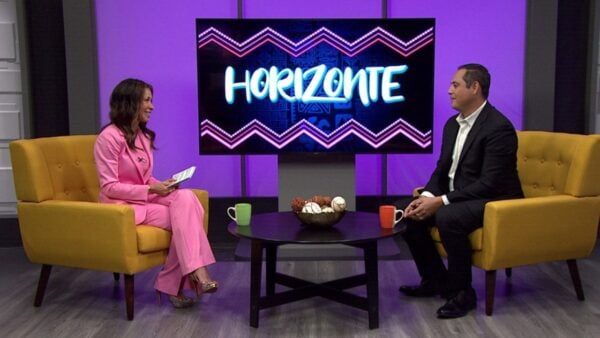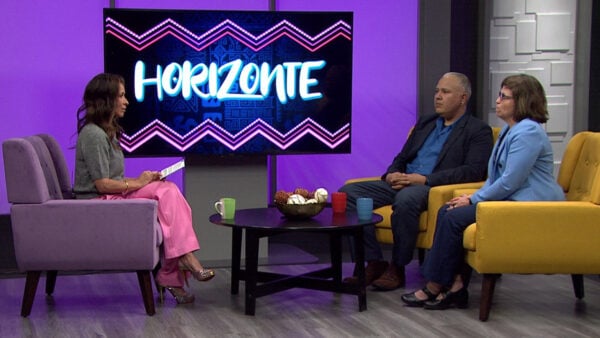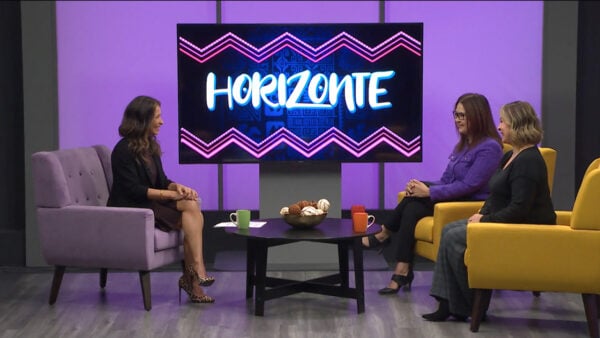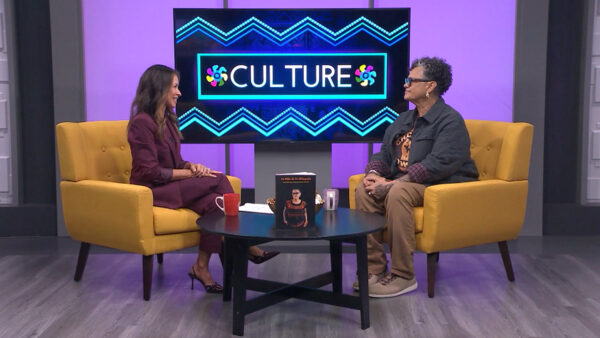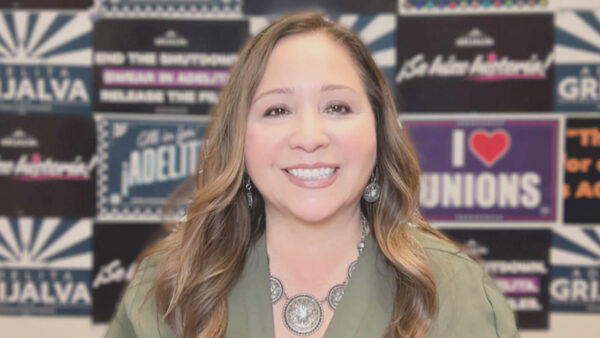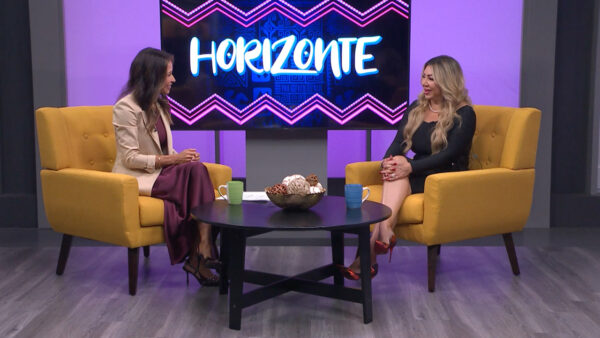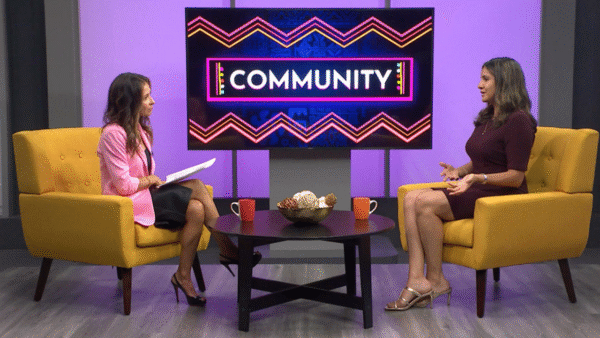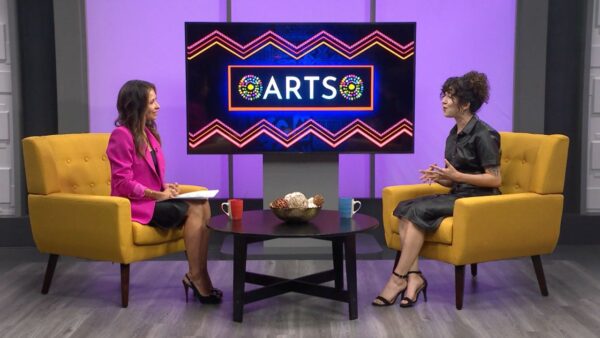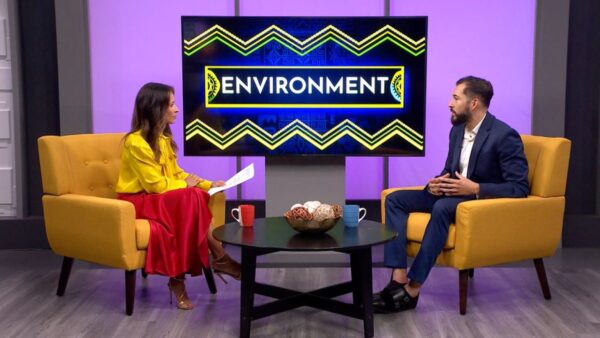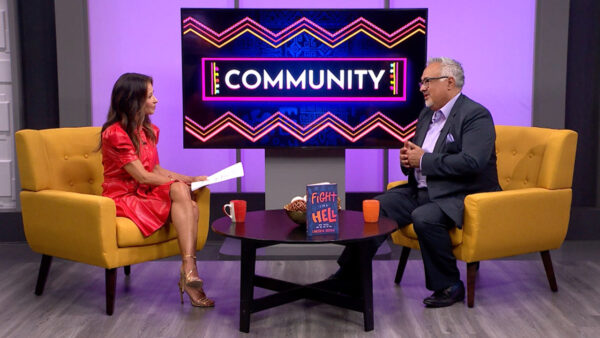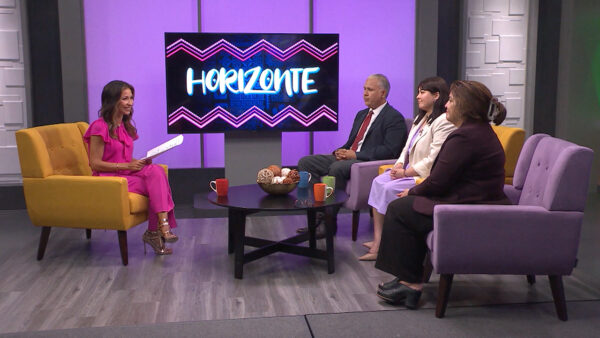On Two Fronts: Latinos and Vietnam captures a complex aspect of the Vietnam War: the legacy of Latino veterans and their families during the conflict. We’ll talk to US Army Vietnam War veteran Tony Santiago and United States Marine Corps Vietnam War veteran Oscar Urrea and ASU History Professor Kyle Longley about the film.
VIDEO: A few years ago nine boys from a local high school joined the marines.
VIDEO: Just on my street, I think there were two people out of 12 houses that didn't have somebody in the service.
VIDEO: You couldn't conceive that one of them or any of them would be killed.
VIDEO: Picture yourself climbing up these hills when we were young, with 80 pounds of gear on us. And, I mean, as a platoon, or a company, and then you're moving up to take the high ground. They would leave us like on this hill, and we had to get to that hill. And take the top of the mountain, and that's where the -- up there.
VIDEO: I already had my mind that one day if there was war I would go to that war and I would die as a hero.
VIDEO: And in my parents' generation, they all served. There was a lot of gratitude for the opportunities that we had here in this country, because my parents were born here, but my grandparents came here from Mexico. It turns out I was qualified to go in the navy --
VIDEO: The defense department, just moments ago, announced that two Californians are the missing pilots of the United States planes shot down in the raid over the North Vietnamese coast.
VIDEO: When my brother was first captured 50 years ago, I remember thinking I wish I was a man so that I could go and fight the enemy. Who knew that it was going to continue for years and years and years.
JOSE CARDENAS: The film clip you just saw is from the film, "On Two Fronts: Latinos in Vietnam," it premiers next Tuesday on Arizona PBS. The film captures a complex aspect of the Vietnam war, telling the stories of latino veterans and their families during the conflict. Joining me to talk about the film are Oscar _______, U.S. Army Vietnam War veteran born here in Morenci, Arizona and Antonio Santiago also known as Tony the marine. And Kyle Longley, ASU professor in the school of historical, philosophical, and religious studies and school of politics and global studies. Thank you for joining us on "Horizonte" to talk both about the film and what went into it and your own personal stories, and, Kyle, speaking of stories, the film is based in part on a book you have written about the young men who went from MORENCI to serve in the war.
KYLE LONGLEY: When the director, Moreno, first came, she showed an interest in the story of the Morenci marines, a story of the nine young men from MORENCI, Arizona --
A book you wrote --
KYLE LONGLEY: Yes, nine young men from the small mining camp in Morenci, Arizona in 1966 who go off to boot camp together and then all end up in Vietnam where six out of the nine die in combat.
JOSE CARDENAS: We have a picture of some of them we will put up on the screen.
KYLE LONGLEY: So you have this, and another book she based on the American combat soldier in Vietnam, that I wrote. So, about four years ago she came to me and several of my colleagues, people who have focused on Vietnam and asked us to help with this process. It builds off of the Ken burns documentary on World War II where Latinos basically were ignored. She has got out ahead of this issue, as burns starts to prepare a new documentary on Vietnam and covered primarily the soldier's story, and also those in the United States who were also protesters. So you've got a nice blend of the story of Latinos across from across United States, Puerto Ricans, Mexicans, Dominicans, many different groups represented, although the story is strongly based in Greenlee County, and also here in Arizona and California.
JOSE CARDENAS: The two fronts in the title of the film, reference to the battles in Vietnam and the protest movement?
KYLE LONGLEY: And the battles back home when the veterans come home they faced discrimination that they had not faced to the same degree in Vietnam. When they return, the battle for citizenship begins. So they're on two fronts, there is the protesters' aspect of it and also the veterans aspect of it having to fight militarily but also continue the fight for citizenship, for equal rights.
JOSE CARDENAS: Oscar, your story is part of the movie. You're from MORENCI. You weren't one of the marines in the army but, while the discrimination may have been worse when you came back, there were issues that you faced while you were there.
OSCAR URREA: Yes, there were issues. Most importantly, I think it was the issue of what you were going to be doing once you arrived there. You had your MOS military occupational specialty, as we call it, and based on where you were needed and the type of job you were going to do, pretty much dictated if you are going to be out in the field assigned to an infantry or artillery unit or stay in the rear doing something else.
JOSE CARDENAS: You were trained at great expense by the U.S. government as a cryptOLOGIST, but you ended up being in the infantry once you got to Vietnam.
OSCAR URREA: Yes, all of those dollars floated off in outer space. I said well, this is the way they treat our fighting soldiers, which I didn't mind. I was trained to handle camo and crypto.
JOSE CARDENAS: How many years were you there?
OSCAR URREA: In Vietnam?
JOSE CARDENAS: Yes.
OSCAR URREA: I just did one tour.
JOSE CARDENAS: And I want to talk about your experiences coming back, because you remained actively involved on behalf of veterans, but before we do that, Tony the marine, your story is not focused on the southwest as a big part of the movie is but you're from New York.
TONY SANTIAGO: Yes, I was born and raised in New York.
JOSE CARDENAS: And one of many Puerto Ricans who served in Vietnam.
TONY SANTIAGO: Yes, yes. When I was a kid, I always had in mind that I was going to join the marine corps. That was one of my things. When the United States went to Vietnam, I decided to volunteer. I wasn't expecting clearly the racism that went on in the service and in Vietnam, and that had an impact. I also wasn't impacted by the fact that the cultural difference between the Puerto Ricans born in New York, they call us Puerto Ricans even though we were born in New York, and the Puerto Ricans that were born in the island.
JOSE CARDENAS: And there were large numbers of both who went into Vietnam.
TONY SANTIAGO: Right. Even though a lot of people are unaware of the contributions which Latinos have made to the war efforts, different war efforts of the United States, there were so many Mexican Americans and Puerto Ricans and other Latinos in the armed forces that I was completely, you know, I am completely surprised at that fact it is never mentioned.
JOSE CARDENAS: And that's become a particular focus for you. I mean, you have written things about the contributions of Latinos in the various wars, not just the Vietnam war.
TONY SANTIAGO: Right, exactly. I have dedicated practically my life to writing about these unknown facts about the Latinos, Latinos contribution to the American Civil War, the revolutionary war, everything, and a lot of these heroes who are unknown to the public. Like, for instance, there are so many Latinos that have won the medal of honor, which is the highest decoration, but yet you never hear the stories. You never see the stories on television or movies. So many Latinos have died, for example, in the Vietnam war, you never hear their stories. You never see that -- so the public, in general, they probably wonder, what did the Latinos ever do for our country?
JOSE CARDENAS: And it is not just the public in general, Oscar. We mention that you have been involved with helping veterans from the war, and one of the things that you ran into in gathering information from them was the number of times veterans were saying I got a bronze star, I got a silver heart, and it wasn't reflected in their paperwork.
OSCAR URREA: That is very true. As I processed some of their claims for disability and comp, and the problem that arises is that when the veteran has a -- in the marines, they have what they call a CAR, combat action ribbon. The army awards them a combat infantry badge.
JOSE CARDENAS: And it is important -- it helps if they are able to say I got this medal or that medal --
OSCAR URREA: And the -- he did serve in combat, but a lot of them, even though they were awarded purple hearts, silver stars, bronze stars, etc., they were never put into the DD214s. That makes it harder to process the paperwork. When you go to disability and comp, in Vietnam, boots on ground, were you in a combat unit or whatever. And they say, yes. Well, it doesn't show here. So, it -- it just delays the process.
JOSE CARDENAS: One of the many problems that Vietnam Vets have faced. Kyle, focusing still on Vietnam itself, Tony talked about some of the prejudices that went on and manifested itself as I understand it, not just name calling, but in how Latino and African-American troops were deployed.
KYLE LONGLEY: Yes, when they arrived in Vietnam, many carried MOS, of either 0-11, or 03-11, which are infantry. And usually infantry units predominantly composed of people who were of color, working-class whites, farmer's kids and the rear echelons in safer areas would go to the more affluent, the ones with better education. So you see the combat, the one where you would be most likely to be out there humping your way through the jungle and under fire being predominantly people like Oscar and Tony and others who came from working class backgrounds, from lower middle class backgrounds. It was a selection. Plus the draft already discriminated to a large degree. Many of the young men coming out of the Latino community in the 1960s, were not looking to go to college. Those that did were able to avoid the draft, we know of the use of the national guard, and other things, gave people a way to avoid having to serve in Vietnam. Unfortunately then it fell on people from the farms, from the barrios, from the, you know, inner cities, and the working class neighborhoods.
JOSE CARDENAS: We have a few more pictures I want to get to quickly, if I can. One, of them, Tony, is I think you with a couple of other guys and this is at the time you're the guy in the middle.
TONY SANTIAGO: Yes, that's me in the middle. Right there, by my side, the taller one, I feel that -- I happen to remember the names, I'm so bad. His last name is Herrera. And the one who has his hand on my shoulder- his last name was Garza.
JOSE CARDENAS: And we have two other pictures I want to get to quickly. About an activity that you have been involved in, Oscar, involving dog tags. And this is a close-up of the dog tags and another shot of you with another veteran putting these up. And this is in Arizona, right? Tell us quickly about that.
OSCAR URREA: Okay. This memorial was spearheaded by the gentlemen you see there and other Vietnam vets from Clifton, and the whole concept was to start putting dog tags to honor those, the first group to honor those, for example, the MORENCI 9. We had others that passed on, I think a total of 13, that had passed away during that war.
JOSE CARDENAS: This honors them.
OSCAR URREA: Yes.
JOSE CARDENAS: Professor Longley, last question, about 30 seconds. What is the significance of the film? What does it tell us we don't already know?
KYLE LONGLEY: I think it tells a lot. I think it brings out the latino contribution, not just during Vietnam, not only on the soldiers, but also the protesters, and that there was a Chicano and Latino community that was very active in relation to the war. They had been there but their voices had not been heard to the degree they deserve to be heard.
JOSE CARDENAS: And going back to the protest issue, one of the guys in the film, his sister was protesting at the same time.
KYLE LONGLEY: Yes. It is a great story.
JOSE CARDENAS: It is a great story. It premiers next week. Thank you all for joining us on Horizonte to talk about it. That is our show tonight from all of us here at "Horizonte" and Arizona PBS. Thank you for watching. I'm Jose Cardenas. Have a good evening.
VIDEO: Funding for "Horizonte" is made possible by contributions of the friends of eight, members of your Arizona PBS station. Captioning Performed by LNS Captioning www.lnscaptioning.com
Tony Santiago: US Army Vietnam War veteran, and Oscar Urrea: United States Marine Corps Vietnam War veteran, and Kyle Longley: ASU History Professor

